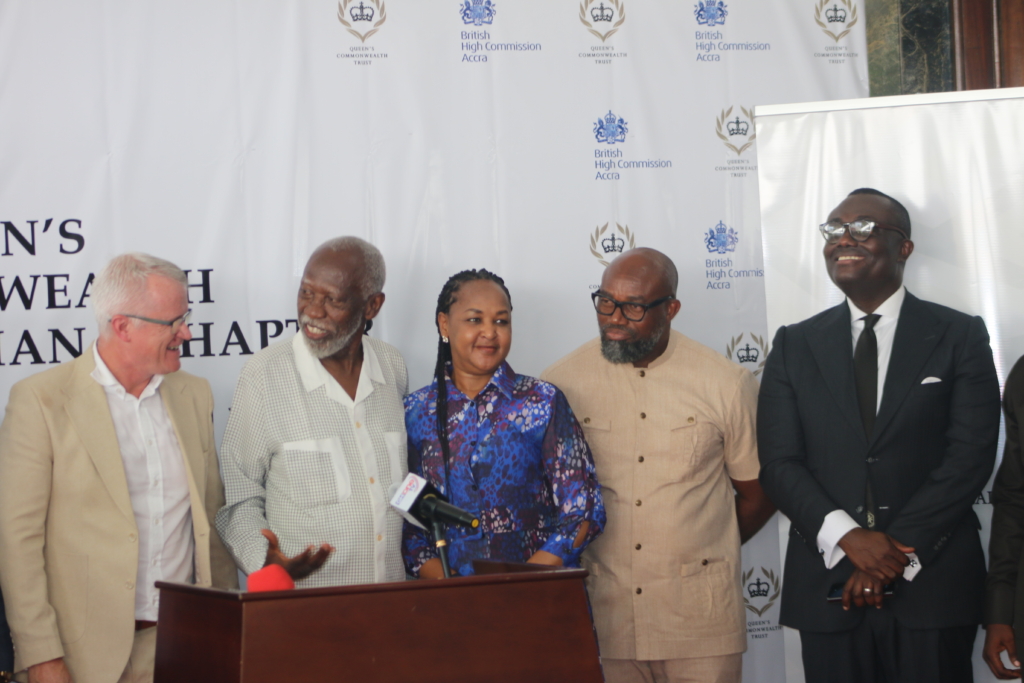The British High Commission in Accra has officially launched the Ghana chapter of Queen Elizabeth II’s Commonwealth Trust, an initiative founded in honour of the late British monarch.
The programme aims to nurture young people from across the country, equipping them with the skills and mindset to become future leaders in Ghana and across the African continent.
Speaking at the launch in Accra on Thursday, 10 April, former Rector of GIMPA, Professor Emeritus Stephen Adei—one of the guests of honour—commended the initiative and emphasised the importance of giving young people the right opportunities.
He encouraged them to remain in Ghana and work towards its development rather than seeking greener pastures abroad, which often worsens their situations.
“There is a need for us to encourage young people and motivate them to believe in themselves—that they can succeed locally. They don’t have to cross the Sahara Desert in search of the meritarian,” he said, referencing the hardships many face while migrating.
Professor Dean Roberts Jnr, High Commissioner and Continental Vice President of UNIPGC USA, as well as Ambassador and Permanent Representative to the United Nations, was also present at the event.
He urged world leaders to offer genuine hope to the youth in their countries.
“Please, leaders of the world, remember what empowerment truly means. Empowerment is not just employment or handing someone money. Empowerment means giving them hope—letting them live through hope,” he stated.
He stressed the importance of peace and security, warning against provoking young people. “If there is no security, there is no peace. I told someone, ‘Don’t provoke the youth.’ In the universities, when the youth are angry and they bring out weapons you never expected to find under their beds, you’ll run. You’ll flee your barracks, because they have more experience than you realise.”
Deputy British High Commissioner to Ghana, Keith McMahon, expressed his belief in the potential of Ghanaian and African youth. He noted that the Trust provides a vital platform to empower the continent’s next generation of leaders.
“This is a proud moment not only for Ghana but for the entire Commonwealth family, as we take another step towards unlocking the full potential of young leaders across our community,” he said.
Kingsley Kwaku Pinkrah, Chairman of the Ghana Chapter of the Queen’s Commonwealth Trust, added:
“It is essential to recognise the immense potential that resides within the youth of Ghana. You are the drivers of innovation, the problem-solvers, and the voices of the future. In Ghana, as across the Commonwealth, young people represent a powerful force for change. The future of our economy, our environment, and our social fabric depends on the energy, creativity, and commitment that the youth bring to the table.”
He explained that the QCT Ghana Chapter seeks to empower youth leaders with the tools they need to scale their initiatives, build sustainable enterprises, and positively impact their communities.
“But we cannot do this alone. We call on the government, private sector, development partners, civil society, and international organisations to collaborate with us in building an ecosystem that promotes equity, access, and agency for all young people—particularly those from marginalised and underserved communities,” he added.
A total of 33 young people have been selected for the Trust in Ghana, most of whom are university graduates, students, and young entrepreneurs.
The Queen’s Commonwealth Trust, established with a strong commitment to youth empowerment, has become a beacon of hope for young social entrepreneurs.
Through the QCT, young people across the Commonwealth have been supported to transform their communities, drive innovation, and deliver sustainable solutions to pressing global challenges.
Since its inception, QCT has supported over 200 young entrepreneurs across the Commonwealth—and this number is expected to grow with the establishment of the Ghana Chapter.
Some of the impacts made over the years include seed grants provided to over 50 social entrepreneurs, enabling them to implement innovative solutions in areas such as climate change, education, and healthcare, capacity-building programmes for hundreds of young entrepreneurs, equipping them with the knowledge and skills to scale their businesses and create employment and also, partnerships have been formed with leading organisations to unlock further opportunities for collaboration, funding, and mentorship for youth-led initiatives worldwide.
DISCLAIMER: The Views, Comments, Opinions, Contributions and Statements made by Readers and Contributors on this platform do not necessarily represent the views or policy of Multimedia Group Limited.

